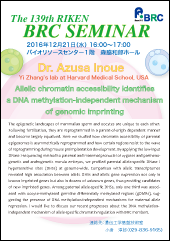The 139th RIKEN BRC SEMINAR
Allelic chromatin accessibility identifies a DNA methylation-independent mechanism of genomic imprinting
Date: Dec 21(Wed.) 2016. 16:00 - 17:00 (JST)
Place: Moriwaki Hall (BioResource Center Main Building 1F)
The invited lecturer
Dr. Azusa Inoue
Yi Zhang's lab at Harvard Medical School, USA
Summary
The epigenetic landscapes of mammalian sperm and oocytes are unique to each other.Following fertilization, they are reprogrammed in a parent-of-origin dependent manner and become largely equalized. Here we studied how chromatin accessibility of parental epigenomes is asymmetrically reprogrammed and how certain regions resist to the wave of reprogramming during mouse preimplantation development. By applying the low-input DNase I-sequencing method to paternal and maternal pronuclei of zygotes and parthenogenetic and androgenetic morula embryos, we profiled parental allele-specific DNase I hypersensitive sites (DHSs) at genome-wide. Comparison with allelic transcriptomes revealed high association between allelic DHSs and allelic gene expression not only in known imprinted genes but also in dozens of unknown genes, thus providing candidates of new imprinted genes. Among paternal allele-specific DHSs, only one third was associated with oocyte-methylated germline differentially methylated regions (gDMRs), suggesting the presence of DNA methylation-independent mechanisms for maternal allele repression. I would like to discuss our recent progresses about the DNA methylationindependent mechanism of allele-specific chromatin regulation with BRC members.
